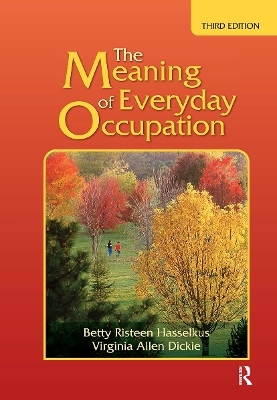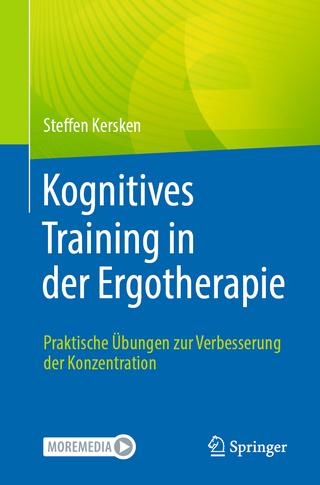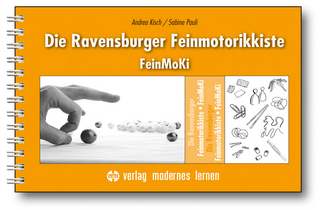
The Meaning of Everyday Occupation
SLACK Incorporated (Verlag)
978-1-63091-483-7 (ISBN)
Newly updated to address emerging directions in occupational therapy and occupational science, The Meaning of Everyday Occupation, Third Edition encourages occupational therapy personnel—students, educators, researchers, and practitioners—to recognize humans as occupational beings and to understand the meaning and significance of everyday occupation in day-to-day life.
Written by award-winning and internationally known authors Drs. Betty Risteen Hasselkus and Virginia Allen Dickie, the Third Edition explores the concept of meaning as it relates to occupation in daily life. Each chapter is augmented by the authors’ personal reflections, narratives from occupational therapists in practice, and quotations from participants in the authors’ occupational research, creating a text in which the concepts and theories of occupation and occupational therapy come alive for the reader.
Themes in the Third Edition include:
Meaning in everyday life and its occupations
Space and place as sources of meaning
Culture in everyday occupation and in the context of therapy
Well-being and development through everyday occupation
Occupation as connection
Disability and occupation
Occupation and the human spirit
Everyday creativity
Emphasizing occupation as experience, the comprehensive Third Edition champions the contributions of meaning to a client-centered approach to practice. This brings forward a new understanding of how to therapeutically affect the systems in which we all live and work.
The everyday occupation of our lives is often overlooked. By increasing the visibility of everyday occupation, The Meaning of Everyday Occupation, Third Edition offers readers the opportunity for personal reflection on day-to-day occupational patterns. By recognizing and acknowledging these patterns in their own lives, occupational therapy personnel can better understand how day-to-day occupation and disruption of that occupation affects the lives of clients.
About the Authors Betty Risteen Hasselkus, PhD, OTR, FAOTA is a Professor Emerita of Kinesiology/Occupational Therapy at the University of Wisconsin–Madison where she served as program director for 10 years. Prior to her faculty appointment, she earned a Bachelor of Science degree in occupational therapy, a Master of Science degree in physical education, and a Doctor of Philosophy degree in adult education at the University of Wisconsin. The hospital where she did much of her training and where she held her first position in occupational therapy is also the building where she was born, where her children were born, and where, ultimately, the academic program of occupational therapy was located during her faculty years. During her more than 50 years of active participation in the profession of occupational therapy, Dr. Hasselkus focused her research, teaching, and practice on the everyday occupational experience of people in the community, with a special emphasis on family caregiving for older family members, physician-family caregiver relationships, meanings of everyday occupation to dementia day care staff, and the meaning of doing occupational therapy. She was elected to the American Occupational Therapy Association (AOTA) Roster of Fellows in 1986 and to the American Occupational Therapy Foundation Academy of Research in 1999. Dr. Hasselkus was the invited Wilma West Lecturer at the University of Southern California in 2001, presenting a lecture entitled, “The Voice of Everyday Occupation.” In 2005, she was awarded the AOTA Eleanor Clarke Slagle Lectureship Award—the Association’s highest award for scholarship—and subsequently gave the award lecture in 2006, “The World of Everyday Occupation: Real People, Real Lives.” Dr. Hasselkus was editor of the American Journal of Occupational Therapy from 1998 to 2003. Her international reputation as a scholar has taken her to Australia, Canada, Sweden, Denmark, Wales, and Northern Ireland, where she has provided lectures and workshops on qualitative research methods, critical analysis, writing, and qualitative research opportunities in everyday occupation. Her scholarly career includes more than 90 publications in journals and texts. In 2017, the AOTA recognized Dr. Hasselkus as one of occupational therapy’s 100 most influential people in the 100-year history of the profession. Virginia Allen Dickie, PhD, OT, FAOTA is retired from the Division of Occupational Science and Occupational Therapy at the University of North Carolina at Chapel Hill where she served as associate professor and then program director for 5 years. She earned a Bachelor of Science in occupational therapy at the University of Wisconsin–Madison; a Master of Science degree in occupational therapy at Wayne State University, Detroit, Michigan; and a Doctor of Philosophy in anthropology, also at Wayne State. While she grew up in Madison (just 50 miles from Dr. Hasselkus’ home) and graduated from the same occupational therapy program, their paths didn’t cross until many years later when they were both special interest chairs for the AOTA. As an occupational therapist, Dr. Dickie’s clinical work was primarily in mental health in California and Michigan. She taught in the Occupational Therapy program at Eastern Michigan University, moving into a program director role during her time there. She moved to the University of North Carolina in 2000, and after retirement from there served as a part-time visiting researcher at Luleå University of Technology in northern Sweden for a little over a year. She was elected to the AOTA Roster of Fellows in 1991, and presented the Ruth Zemke Lecture in Occupational Science at the Society for the Study of Occupation: USA in 2009. Dr. Dickie has presented the Ellen Garms lecture at Wayne State University, the Caroline Thompson lecture at the University of Wisconsin–Madison, the Breakfast With a Scholar lecture at the Kentucky Occupational Therapy Foundation, and the Mitchell Symposium lecture at the University of North Carolina–Chapel Hill. Her research focused on understanding occupation through two ethnographies: the first of independent crafters who sold their work at craft fairs in Michigan, and the second of contemporary quilt-making in North Carolina. From this work she developed an awareness of the interdependence of people and their situations, which led her to collaborate with colleagues to develop a transactional perspective on occupation. Dr. Dickie has given many presentations and published extensively with papers related to her research, to qualitative research methods, and to the transactional perspective on occupation. Dr. Hasselkus and Dr. Dickie have been close colleagues and research partners throughout their careers in occupational therapy practice, higher education, and research. Their research on the meaning of “doing” occupational therapy was on the cutting edge of research in occupational therapy and occupational science that addresses the lived experience of carrying out occupational therapy practice.
CONTENTS Dedication Acknowledgments About the Authors Introduction Chapter 1 Meaning in Everyday Life Individual and Community Meanings Meaning and Performance in Life How Do We Know Meaning? Being Open to Ways of Knowing Chapter 2 Meaning in Everyday Occupation Defining Occupation Breaking Out of the Box: Doing, Being, Becoming, and Belonging Occupational Justice Chapter 3 Space and Place: Sources of Meaning Space and Place in Our Lives Space and Therapy A Place to Call Home Special Places A Geography of Health Chapter 4 A Cultural Perspective on Everyday Occupation Culture Defined Recognizing and Understanding Our Own Culture(s) Encountering Otherness Culture in the Therapy Context Chapter 5 Everyday Occupation: Source of Well-Being and Development The Essence of Well-Being Synthesis Through Occupation Relative Well-Being Occupation and Lifespan Development Occupation as the Experience of Everyday Living Chapter 6 Occupation as Meaningful Connection Relation and Well-Being Occupational Forms of Relation Relation and the Professional The Therapeutic Relationship as Connection Occupational Therapy and Connectedness Chapter 7 Disability and Occupation Disability as Difference Shifting the Focus to Participation The Faces of Disability Victory and Defeat Occupation as Disability Experience Disability as Occupational Experience Being the Bridge Chapter 8 Occupation and the Human Spirit Occupation and the Human Spirit in Everyday Life The Human Spirit in the World of Occupational Therapy Occupation and the Space Within Chapter 9 Everyday Creativity as a Source of Meaning Creativity From Without and Within Arising From Chaos Creativity and Health The Dark Side of Creativity To the Dancing Star Chapter 10 Occupation Speaks: Final Thoughts The Therapist and the Splint Index
| Erscheinungsdatum | 10.08.2020 |
|---|---|
| Verlagsort | Thorofare |
| Sprache | englisch |
| Maße | 178 x 254 mm |
| Gewicht | 576 g |
| Themenwelt | Sachbuch/Ratgeber ► Gesundheit / Leben / Psychologie |
| Medizin / Pharmazie ► Physiotherapie / Ergotherapie ► Ergotherapie | |
| ISBN-10 | 1-63091-483-5 / 1630914835 |
| ISBN-13 | 978-1-63091-483-7 / 9781630914837 |
| Zustand | Neuware |
| Informationen gemäß Produktsicherheitsverordnung (GPSR) | |
| Haben Sie eine Frage zum Produkt? |
aus dem Bereich


